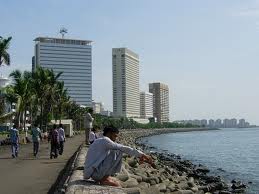There are many beautiful cliches about Mumbai, most of them true. The one you can absolutely not argue with is that it is hospitable down to its last square inch. Most of Mumbai’s fabled energy comes from that. From the fact that it welcomes everyone. No one can politicise the heart of Mumbai though yes, they have tried and will continue to. In a way, Mumbai represents the best of who we are. Resourceful survivors. Making the most of the least. Eternally optimistic despite lacks. Finding ways to celebrate the little, the less, the bare minimum. Going on no matter what.
It is not accidental that Mumbai is a magnet for the entrepreneurs, dreamers and the terrorists. The first two come because they see opportunity. The last because, they see both vulnerability and strength. And they know it is an easy city to penetrate, to attack because it is so trusting, so open hearted and so unprotected. And because it goes on, it must be stopped, must be made to register loss, tragedy, pain, anger, helplessness. Because everytime it is made to bleed and its most obvious symbols of efficiency and hospitality are attacked (The local trains, CST, the stock exchange, the bustling lanes of Zaveri bazaar, hotels, restaurants), it somehow finds the courage to wake up the next morning, count its dead, mourn them and leave the safe confines of home for another day at work. The city must be attacked again and again because it won’t stop. Can not be stopped.
The fact that it doesn’t stop lets those who do little to protect Mumbai, get away with ineffectual excuses, hand wringing, blame shifting. On July 13, five years and two days after the serial blasts in Mumbai’s local trains, three blasts replayed in Zaveri Bazar, Opera House and Dadar Kabootarkhana, the scenes and soundbytes we have seen and heard repeatedly on television. Confusion. Chaos. Urgent voices giving minute by minute updates. Statistics about the dead and the wounded. Top cops talking about the situation being under control. Eyewitness accounts. Opposition leaders closing in for a kill.
There was one particularly significant change in the tenor atleast in one instance. A profusely sweating news reporter who had also possibly cried moments before she faced the camera, was surrounded by an irate crowd in Zaveri bazaar, not keen to answer questions but to ask them. One old man snapped, “One minister comes and they stop traffic. If something happens to a minister, won’t they find another? But when someone loses a loved one, can they find a replacement?”
Another said, “What do you mean what I saw? Don’t you know by now what I would have seen?”
“It has been two hours since the blast. No one has come to help us.”
“Those who saw the blasts, won’t be able to sleep for days. Body parts everywhere.”
“The windows shook so loudly.”
“If the crores they have spent on guarding Kasab had been used to protect Mumbai and its citizens, this would not have happened again.”
And the invisible writing on the wall became suddenly easy to read. That victimhood is not a virtue. That if terrorists strike repeatedly, with jovial disregard for the law and order machinery, it is because the law and order machinery is not working.
And that those helming Mumbai must take a big share of the blame for its shoddily managed monsoons, its routinely flooded roads and bomb blasts that go on ad nauseam like punctuation marks between years and stop trains, bazaars and nerve centres.
Mumbai knows now that its chronic helplessness stems from incompetence and lethargy and corruption and an absence of accountability. For a very long time now, Mumbai has been used as a political pawn, as a piece of cake, as a goody bag. What has made it such a soft target is that it is administrated by some of the most powerful men in the country without the pride and passion that even a shoe shine boy or a leather worker in Dharavi or a taxi driver invests in his work.
The Mumbaikar is too much in love with this city and the idea of earning a day’s living to let anything stop her/him but that should not be used as an excuse by politicians to do nothing, blame each other, serve assorted political agendas, make appropriate noises and leave the city to its own devices. Till the next flood, the next blast, the next siege.
What can be done to ensure that the most hospitable city in the world shuts its doors to terrorism and refuses to put up with leaders who don’t deliver?
Someone, somewhere should answer that question. It is time.
Reema Moudgil is the author of Perfect Eight (http://www.flipkart.com/b/books/perfect-eight-reema-moudgil-book-9380032870?affid=unboxedwri )






